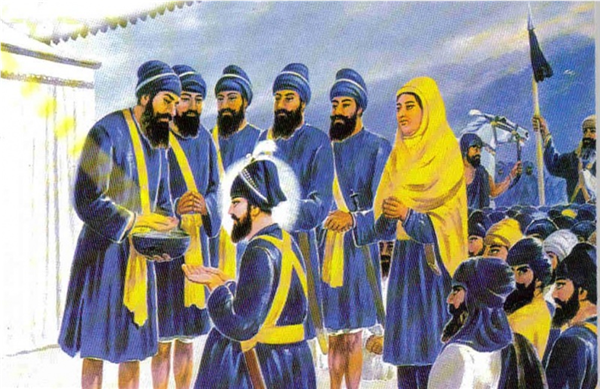|
||||
|
||||
|
|
||||
|
Vaisakhi, also called Baisakhi, is the festival which celebrates the founding of the Sikh community, the Khalsa, in 1699. It was originally a harvest festival in the Punjab until it became one of the most important dates in Sikhi. Vaisakhi happens on the 13/14 April every year. In 1699, Sikhs from all over the Punjab gathered together to celebrate the local harvest festival of Vaisakhi. The tenth Guru, Guru Gobind Singh Ji, came out of a tent carrying a sword. He asked for anyone who was prepared to give their life for their religion to step forward. A young man stepped forward and went into the tent with Guru Gobind Singh Ji. The Guru came out of the tent alone with his sword covered in blood and asked for another volunteer. This happened four times until five Sikhs had gone into the tent.
Everyone was very worried that five men had died. However, they all came out of the tent alive and wearing turbans. The five men became known as the Panj Piare or 'Beloved Five'.
Guru Gobind Singh then baptised all the men into the Khalsa. He recited prayers and sprinkled them all with sugar water called Amrit. These five men became the first members of the Khalsa. This ritual became the basis of the Sikh baptism ceremony.
At the same time the Guru gave his new Khalsa a unique and distinct identity. The Guru gave the gift of bana, the distinctive Sikh clothing and headwear. He also offered five emblems of purity and courage. These symbols, worn by all baptised Sikhs of both sexes, are popularly known today as Five Ks: Kesh, unshorn hair; Kangha, the wooden comb; Karra, the iron (or steel) bracelet; Kirpan, the sword; and Kachera, the underwear.
On Vaisakhi, Sikhs go to the Gurdwara in the morning for a service. Afterwards, they have a procession through the streets called the Nagar Kirtan. 'Nagar' means town and 'Kirtan' means the singing of hymns from the Guru Granth Sahib, which is the Sikh holy book. If you live in Telford you may have seen this procession taking place.
Guru Gobind Singh Ji gave the surname of Singh (Lion) to every Sikh and also took the name for himself. He also pronounced that all Sikh women embody royalty and gave them the surname Kaur (Princess). Singh and Kaur are used today by many of the Sikh community as middle names alongside their family surnames. With the distinct Khalsa identity and consciousness of purity Guru Gobind Singh Ji gave all Sikhs the opportunity to live lives of courage, sacrifice, and equality.
Many farmers in the Punjab continue to use Vaisakhi as an opportunity to give thanks for a plentiful harvest and to pray for a good one in the year to come.
| ||||
Reply to this message | ||||
|
||||
|
|
||||

|
|








